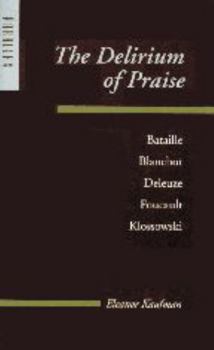The Delirium of Praise: Bataille, Blanchot, Deleuze, Foucault, Klossowski
(Part of the Parallax: Re-visions of Culture and Society Series)
The laudatory essay, in which one author praises the work of another, is frequently characterized as an unimportant, even uncritical mode of writing. But as Eleanor Kaufman argues in The Delirium of Praise, this mode of exchange is serious and substantial enough to merit scholarly attention. By not conforming to standard practices of critical discourse, laudatory essays give new status to supposedly inferior forms of communication and states of being--including chatter, silence, sickness, imbalance, and absence of work--and emphasize affective states or emotions such as joy, friendship, and longing.
The Delirium of Praise examines a group of five twentieth-century French intellectuals--Georges Bataille, Maurice Blanchot, Michel Foucault, Gilles Deleuze, and Pierre Klossowski--and their laudatory essays about each other. Structured as a circular series of exchanges, the book examines pairings of two thinkers with respect to a given theme. The exchange between Bataille and Blanchot takes up the themes of chatter and silence with regard to the novelist Louis-Ren des For ts; the Blanchot-Foucault exchange explores friendship and impersonality through the lens of Jacques Derrida; the Foucault-Deleuze exchange considers "absence of work" (d soeuvrement) and the obscure French philosopher Jacques Martin; the Deleuze-Klossowski exchange revolves around the question of the sick body and the person of Nietzsche; and the final exchange between Klossowski and Bataille focuses on imbalanced economies and the writings of the Marquis de Sade. Where the praise is most excessive, approaching delirium, Kaufman locates a powerful thought-energy that pushes the laudatory essay to its limits. In her conclusion, she presents this unique mode of thought exchange as a form of intellectual hospitality.
Kaufman uncovers a suspension of subjectivity, of personality, even of place and time, that is both articulated in the laudatory essays and enacted by them. Her examination of this neglected mode as practiced by five important French thinkers offers a unique perspective on twentieth-century intellectual history.





